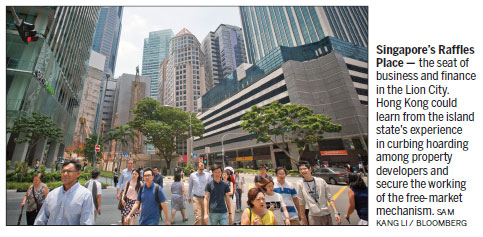Housing woes - the Lion City can do much more than HK
Updated: 2017-04-07 08:02
(HK Edition)
|
|||||||||
Even the most ardent admirer of Hong Kong must concede there's much for this city to learn from its rival Singapore in managing the property market.
Both the SAR and the Lion City had enacted a series of measures to rein in their respective red-hot property sectors. In Singapore, they worked but not in Hong Kong.
Homes prices in Singapore had soared more than 60 percent within a four-year span - from the second quarter of 2009 to the second quarter of 2013 - prompting the authorities there to act. Since then, average real-estate prices have come down continuously. But, the Singapore government, worried about a possible fallout of the prolonged downtrend in property values, is moving to rescind some of the measures in place.
In contrast, Hong Kong's property market seems completely impervious to the tough measures imposed to curb runaway prices. Industry experts have blamed abnormally low bank interest rates for fueling demand. Whatever the reason, the surge in homes prices appears to be unstoppable.
It's easy to see why those government measures to influence the prices of either assets or commodities seldom work. In the case of property, the much more relaxed economic environment has allowed developers, backed by their vast financial resources, to neutralize government efforts with various counter measures.
For instance, some major builders are offering 100-percent mortgage financing to buyers of their properties, while banks have to abide by the 60-percent ceiling. Earlier this year, the government drastically raised the property sales tax to discourage people from buying second homes for investment purposes. But, many property agents have offered to absorb part of the increased tax to boost sales.
Much of the government's efforts to solve the problem arising from escalating housing prices focus on increasing land supply. But, there's little guarantee that more land will lead to a corresponding increase in the supply of properties for sale to the public.
To prevent land hoarding, Singapore has set a fixed time for developers with non-Singaporean shareholders to complete their projects and sell all the units. Failing to comply with the rule is subject to a heavy penalty of at least 10 percent of the land price.
This is a rule that Hong Kong should consider because hoarding can seriously disrupt the working of the free-market mechanism.

(HK Edition 04/07/2017 page9)